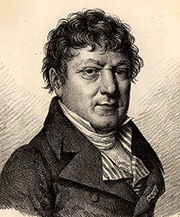On this date in 1749, Jean Baptiste Delambre was born in France. Delambre made huge contributions to astronomy despite losing most of his vision to smallpox as a toddler. He was educated at a Jesuit school in Amiens until the Jesuits were expelled from France in 1764. Although contemplating life as a priest, Delambre became a rationalist and atheist. He tutored, then studied in Paris under the eminent atheist and astronomer Joseph Jérôme Lalande, becoming his assistant.
In 1789 Delambre recorded the transit of Mercury across the sun and corrected the existing tables. In 1789 he won the Grand Prix from the Academy of Sciences for calculating the precise orbit of Uranus. He was given his own observatory in 1789. In 1792 he published tables on the sun, Jupiter, Saturn, Uranus and the satellites of Jupiter. Delambre wrote the first of three volumes containing the measurement of Earth in 1806. In 1809, Napoleon, his admirer, asked the academy to award a “best scientific publication of the decade,” which went to Delambre.
Delambre’s multi-volume History of Modern Astronomy (1821) became a science classic. Mathematician Jean Fourier, in his obituary of Delambre, said the scientific world was indebted to him for the geodetic operation. The United States was indebted to Delambre for his role in freeing a Mr. M. Smithson, a political prisoner of war. In 1809, Delambre wrote the French Ministry of War requesting his release. Smithson later bequeathed his extensive estate to the United States to found the establishment that became the Smithsonian Institution. (D. 1822)


